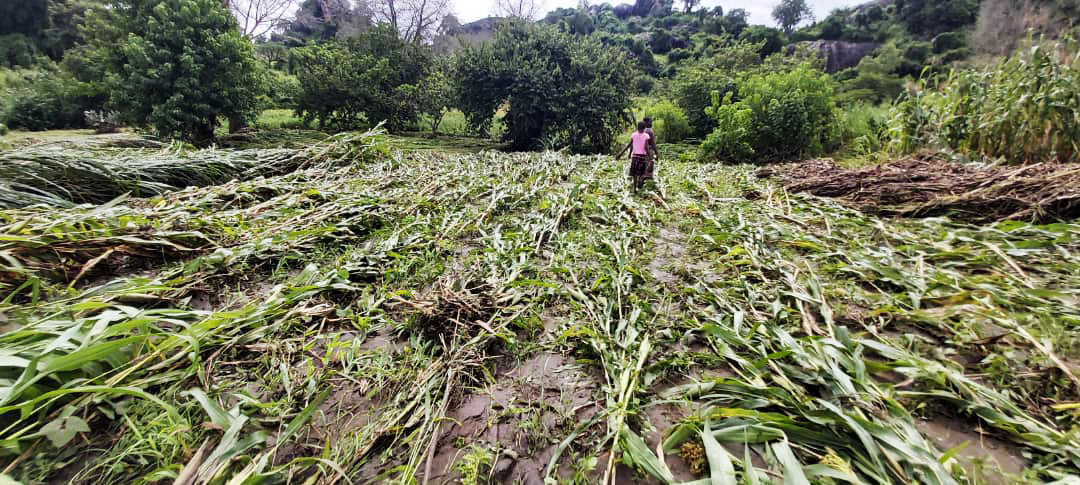By Alick Ponje
Copyright times

Mphatso, a smallholder farmer working the banks of the Shire River in Chikwawa, walks slowly between rows of young cassava and sweet potatoes, their green leaves flickering in the sun.
Just a few months ago, this land was lifeless. Now, under the gentle grip of winter, it shows signs of promise.
The plants are not yet ready for harvest, but for the first time in over a year, they have given Mphatso hope.
When the last harvest failed, Mphatso stopped rising early. He would lie awake most of the night, then sit outside in the morning, staring across his fields with no reason to move.
“I avoided my friends and my appetite disappeared. Thoughts I could not explain pressed heavily on my mind. At times I simply wanted the days to pass quickly so that they would end,” Mphatso says calmly.
He did not speak of it to anyone.
Nor did Ruth, a mother of three from a nearby village, when her own family ran out of food. Her husband had left two months earlier in search of work in Mozambique and had never returned.
She tried planting pumpkins, but the drought shrivelled the vines before they bore fruit.
In her village, as in many areas across Malawi, mental distress is not openly acknowledged. When someone begins to withdraw, stops talking or shows signs of despair, neighbours often whisper of curses or ancestral wrath.
“We do not call it depression. We just say, ‘She is thinking too much’,” Ruth says.
According to health reports in Chikwawa District, symptoms such as insomnia, persistent sadness and fatigue become more common, particularly during the lean season.
Few people seek help. Most suffer quietly, still convinced that such conditions are either shameful or supernatural.
Experts, however, see a clear pattern. Psychologist Rachel Nyondo says climate-linked trauma has been rising in rural areas.
“When you lose your crops year after year, when your children are crying from hunger and you feel powerless to change it, the mind begins to collapse,” Nyondo says.
“We are seeing growing levels of untreated depression, anxiety and even suicidal thoughts among farmers,” she adds.
Statistics from the Ministry of Health reveal that by mid-2025, 303 people had taken their own lives in just six months.
Suicide cases have been rising steadily, from 286 in 2021 to 597 in 2024, with climate-induced reasons cited as some of the triggers, according to research.
Over 80 percent of Malawians depend on farming for survival. Climate change’s repeated shocks such as droughts, floods and cyclones are causing food shortages, displacing communities and deepening poverty.
These effects, in turn, reportedly contribute to mental health challenges and increase vulnerability to gender-based violence.
Researchers at Glasgow Caledonian University’s Mary Robinson Centre for Climate Justice have uncovered further evidence of this link.
Their study found that 86 percent of surveyed women reported that climate change had harmed their mental health and wellbeing, far more than those who reported physical health impacts.
Emotional pain, depression, restlessness, trauma and suicidal thoughts were common themes.
“Climate change does contribute to changes in mental health and issues of violence faced by women. Solutions must be people-centred and recognise the lived experience of vulnerable groups,” said Professor Tahseen Jafry, Director of the centre.
Providing a frontline perspective, Tsogololathu Itaye, a social work lecturer at the University of Malawi, describes the psychosocial toll of Tropical Cyclone Freddy in 2023, which displaced over 650,000 people and destroyed thousands of homes.
She notes that despite the physical aid provided, psychological support was scarce.
“Counselling was brief and insufficient. Many who needed help were not reached,” Itaye said in an opinion piece republished by The Daily Times.
She underlines that disaster risk management must prioritise mental health and cultural sensitivity alongside the rebuilding of infrastructure.
Back in Chikwawa, Ruth might never have sought help if not for a village health worker who noticed her isolation and referred her to a community counselling circle.
The sessions were held discreetly in a neighbour’s home.
“They asked me questions I had never thought about before. That is when I realised what I was going through had a name,” she says, relief evident on her face.
However, counselling alone could not solve hunger.
By January 2025, the food crisis had deepened across southern Malawi. The government, supported by its partners, launched an emergency aid response targeting the worst-affected districts.
More than 2.3 million people received bags of maize flour, beans and cooking oil during the lean season.
When the relief truck arrived in Mphatso’s village, people lined up in silence.
“I cried when I saw the maize. I had not cried in months but I could not hold it,” he says, recalling how he cooked that night and sat down with his family without shame or fear.
The assistance gave him space to plan. He began preparing for winter cropping, switching from maize to drought-resistant crops.
Ruth also planted vegetables in a small backyard plot, using techniques she had learnt from a women’s farming cooperative.
Both say they are now watching their land with belief, something they had lost entirely the year before.
Their new crops are holding steady. The cassava leaves are full, the sweet potatoes are taking root. The green patches across their fields are proof of recovery.
Yet the mental health toll ripples beyond farmers.
A meeting in Lilongwe, organised by the Development Communications Trust (DCT) with Unicef support, highlighted how drought affects schoolchildren’s academic performance due to hunger and stress.
Teachers in districts such as Chikwawa and Nsanje report high absenteeism and dropouts, with learners unable to concentrate due to food insecurity.
Teachers themselves experience stress, often lacking support and training to address mental health issues in schools.
DCT Executive Director Prince Mtelera urged that teachers be included in relief efforts, as their wellbeing directly affects education.
“If teachers leave classes because they have no food at home, learners lose out, creating a cycle of problems,” he says.
Still, the memories remain. Mphatso says he often looks at his children and recalls the hunger, the silence, the days when he avoided their eyes.
Ruth still worries that the rains may fail again or that next year’s aid may not arrive in time.
“You do not forget what it feels like to watch your children starve,” she says.
Still, she speaks to other women in her village, encouraging them to open up if they feel overwhelmed.
Mphatso has joined a local group of farmers experimenting with soil conservation and water retention methods.
Neither of them claims to be fully healed, but both believe they are no longer drowning, even though they remain in constant fear of what the next rainy season will bring or fail to bring.



